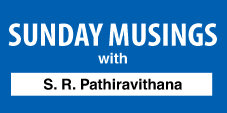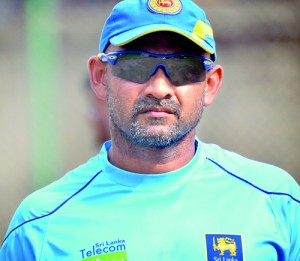Coach in a circus: Lessons from Farbrace files
View(s):With Paul it was far from a brace for the Lankans. Just think back, it may be that the real hard yards towards that golden moment in Lankan cricket were put in by Farbrace’s predecessor Graham Ford, who decided to take the Surrey call just four months before the T-20 World Cup challenge. Then amongst quite a vibe Paul Farbrace was reluctantly given the job till the end of the 2015 World Cup in Australia.
But, sometimes miracles do happen. In just over three and a half months, even before Farbrace could master all the names in the Sri Lankan national cricket squad, he had become a part of a team that brought home two major cricket titles, the Asia Cup 2014 and the  T-20 World Cup 2014.
T-20 World Cup 2014.
He was in the right place at the right time to get his CV requirements right. At the same time, back in his home town, the battered and bruised England Cricket Board (ECB), after the kick on its butts by a left-footed wild Kangaroo named Mitchell Johnson, was honestly looking for a coaching team with the right credentials to take up the challenge of making the tottering and injured Lion walk again. Peter Moores, the Lancashire first coach, made it to the top of the England coaching ladder for the second time while former Yorkshire second coach Paul Farbrace, who by then was the top coach in the successful Lankan line-up, got the offer of a lifetime to serve as the second coach in the England team.
Probing a bit deep into the Farbrace episode would be an interesting exercise. After the Graham Ford doosra that exposed all the Lankan stumps to the elements and left the SLC hierarchy agape, there was an honest search for a babysitter for the Lankan cricketers.
Then at one end of the ring, a certain camp put up a contestant to challenge for the post. It was onetime Lankan captain and incumbent batting coach Marvan Atapattu. However, the game plan of this camp was challenged by a group more aligned to the thought of having a foreign coach.
This turned into a test of wits. The Marvan camp was adamant that the Lankan should get it. However, the other camp had a problem. Though there were names including some big names such as Greg Chappell, being floated, nothing seriously materialised until a sudden shock from Sussex surfaced from nowhere. It was little known Mark Davis, who was one of the coaches in the Sussex line-up.
Though Davis had the required professional coaching credentials and was impressive at his presentation, he was shot down by the opposing camp as he was hardly known in the big league.
Then suddenly the name of Paul Farbrace propped up.

Marvan has got the hot seat for the time being
Farbrace earlier had acted as Lankan national coach Trevor Bayliss’ second-in-command and then resigned from his position in the wake of Chandika Hathurusinghe being absorbed into the Lankan coaching cadre as shadow coach.
However Farbrace had kept a good profile while in Sri Lanka and the insiders knew his capabilities. Then when Farbrace came over for the presentation, he was made to understand that he would be given the job until the 2015 World Cup in Australia-New Zealand, after which Atapattu would be drafted in as the national coach.
For Farbrace who was Yorkshires second coach, a job in the big league was an opportunity. Even for a given period of time he was going in for the big time and work with a group of cricketers whom he knew. Farbrace was aware of the capabilities of the Lankan cricketers and that was good enough. At the same time he was also aware of the political pitfalls that the Lankans always bring in. As expected during the three months he spent in Sri Lanka as national coach — though high in profile — the job carried some personal challenges which were served along with a Lankan flavour. This included a very unsavoury crossing of swords with an acolyte of a powerful individual, which Farbrace managed to tackle without a huge explosion during their excursion in Bangladesh.
The Lankan cricket officialdom since 1996 has been very volatile. It was run by people whom the ICC looked down upon or the Lankan political culture frowned upon. Or else it was run by political yes-men who were air dropped in the guise of interim committee personnel. Then even after, we all know how the so-called democratic elections brought in the office bearers to their respective seats.
From the coaching brood, barring Tom Moody, who held on to a firm two-year term and did a professional job, the rest of the coaching fraternity that worked with Sri Lankan cricketers have been CV seekers rather than persons who were on top of their jobs.
There are two tails to this Lankan coaching tale. The first is the cash-strapped Lankan administration cannot afford the real market price that is demanded by high profile Greg Chappell and company. At the same time prospective coaches are aware of the volatile political climate in Lankan cricket.
Then the second lot are the Mark Davis, Graham Ford and Paul Farbrace club members. They are the second string aspirants who are waiting for their international break. They are well aware of what the Lankan cricketers have achieved and what they are capable of. It is also not a difficult proposition as coaching the Pakistan outfit. Country-wise Sri Lanka has a better environment. At the same time the Lankan cricketers have more promise of achievement than Bangladesh, Zimbabwe or New Zealand. In short, Sri Lanka is the ideal CV factory to the second grade international coaches. So they take up the Lankan job and then scan the coaching job circuit with enhanced credentials.
Then what about the Lankan coaches, why can’t they do the job? I asked some detractors. Without any hesitation they also blamed the political culture in Sri Lanka. They point out that any Sri Lankan who does the job will have to contend with numerous requests and pleas from very influential social elements which they would find hard to refuse. Then the reverse psychology begins to work and the individual will not be able to fulfill his real obligations. For instance they bring out the 35,000 foot example. When there is a proposition of that stature, they ask which Lankan could refuse or even side-step.
Besides they point out the cultism. It is a well-known factor when you are in constant motion from country to country as a group; you tend to pick out a cult of your choice to hang out. When the coach is a Sri Lankan, they say, splinter groups within the team or the squad can work in a negative manner as even the coaches are susceptible to fall in line with a faction of his choice. This is where the real danger lies, they say. They are of the view that with non-Sri Lankans coaches aligning themselves with groups are much less.
This is the bare truth that prevails in Lankan cricket. This is not a culture that was designed yesterday. This is a culture that has been going from bad to worse from every full moon since 1996.
Just look at Sri Lanka’s present cricket plight — at a time when the entire cricket community should be engulfed in the World Cup winning euphoria, we are fighting in and out. From one corner the two most senior players in Kumar Sangakkara and Mahela Jayawardena were at loggerheads with the management.
Then the top-rung cricketers were refusing to sign their central contracts and even flouting the board’s dress code at practices.
Then from the third end the Lankan cricket authorities are hit by the CV blight and a running in circles like headless chickens.
Isn’t it time to sit back and take a deep breath and throw the searchlight inwards to ascertain, where we have gone wrong and where we are heading. Is this the work of one stubborn power crazy individual or is it the result of a string of bad collective decisions stuffed with a bad vision.
Sri Lanka cricket does not deserve this treatment. Over the years it has kept us as a proud nation with a string of achievements that some of the others could only dream of.
Knowing all these drawbacks the management should be on the lookout. Now Marvan Atapattu has been given the greenlight to be at the helm of coaching, with selection committee Chief Sanath Jayasuriya lending a helping hand. This run would go on until the end of Lankan’s engagement with South Africa. It is also good to note that fielding coach Ruwan Kalpage has been rewarded with the assistant coach position.
Yet, to be very honest, aren’t we back at the place where we began?


